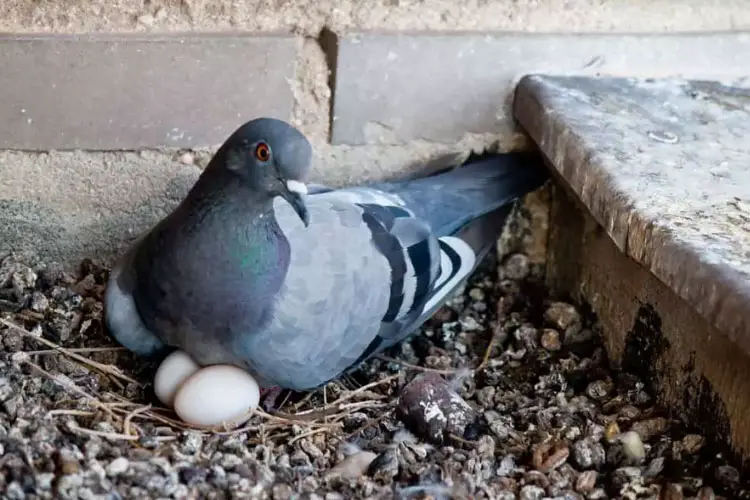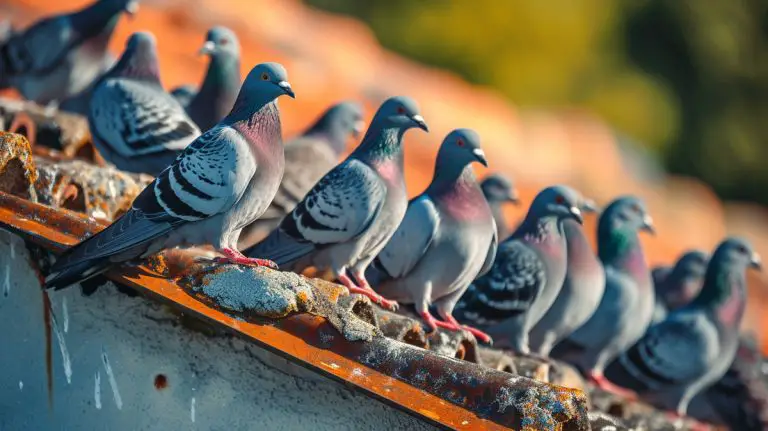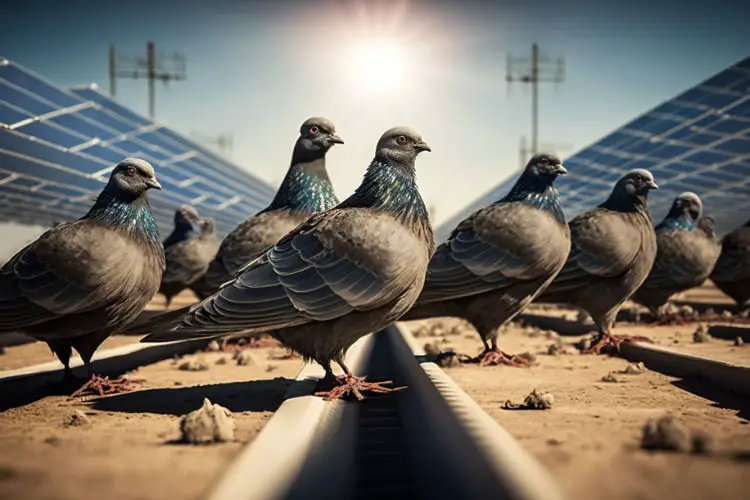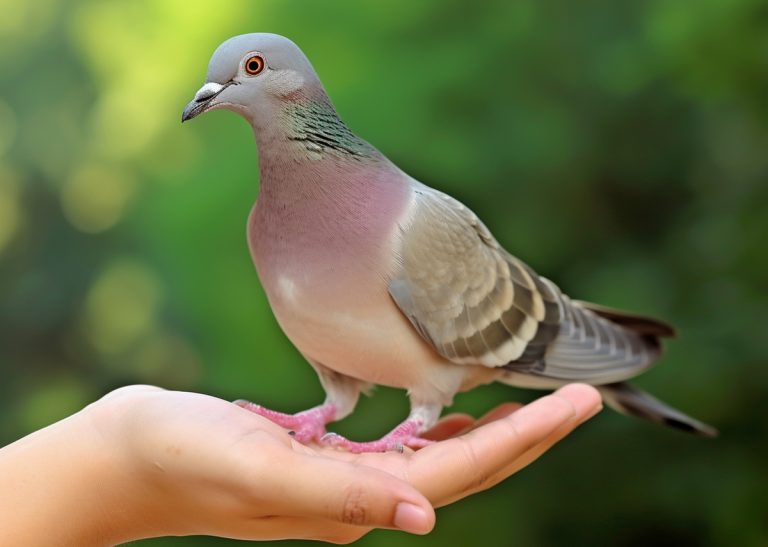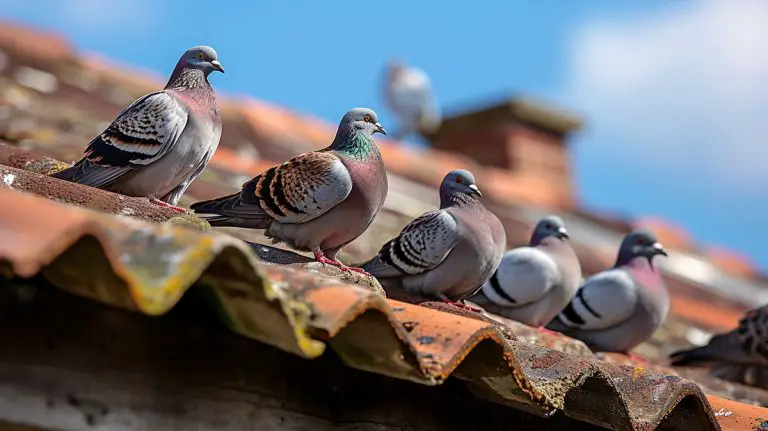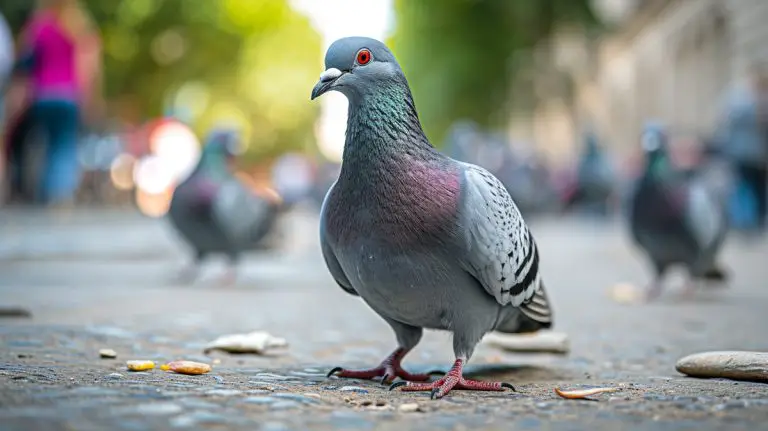Do Crows Eat Pigeon Eggs?
Crows have a reputation for being highly opportunistic feeders who will seize nearly any edible item in sight.
But, do crows eat pigeon eggs? Crows are known to eat pigeon eggs as part of their diet. However, it is essential to note that crows are opportunistic feeders, meaning they will eat various foods depending on what is available to them. That means that other food sources, such as garbage or fruit, may influence the likelihood of a crow eating pigeon eggs.
Read on to learn more about whether crows fancy eating pigeon eggs and answers to some burning questions about the topic.
Do Crows Eat Pigeon Eggs?
Crows are renowned for their opportunistic feeding behavior and will consume almost anything located. That includes pigeons’ eggs, though crows aren’t solely focused on predating eggs as a food source.
They also feed on fruits, insects, seeds, and tiny creatures like frogs or lizards. In other words: if you’re looking for an example of a broad dietary range in animals – look no further than the crow.
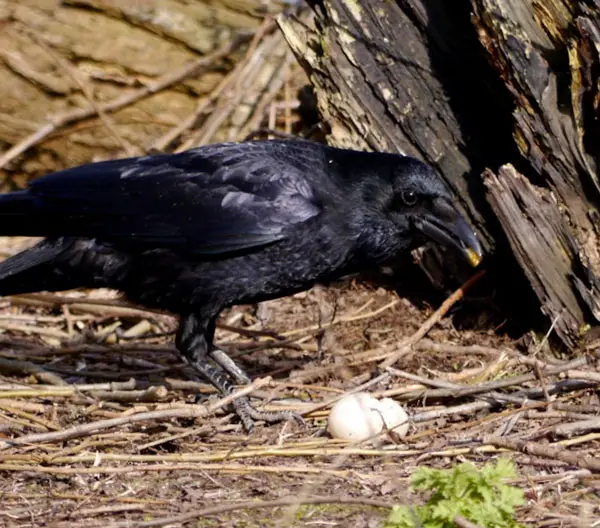
The availability of alternative food sources, such as garbage or fruit, does take away a crow’s desire to consume pigeon eggs. However, if they have access to generous amount of meat or fruits, they won’t need to hunt for eggs. However, in areas with sparse nutrition options, crows will likely turn towards their eggy counterpart as sustenance.
Not only does availability influence a crow’s egg selection, but the size of the egg also plays an important role. Due to their huge beaks, crows can enjoy gander or duck eggs when available.
However, it may be more difficult for them to crack open and consume smaller eggs, such as those from pigeons.
Crows are renowned for their cunningness and aren’t shy about taking advantage of every opportunity. They have been observed using sticks to capture eggs beyond their beak’s reach. They also collaborate with other flock members to create a decoy while the other pilfers the egg.
Here is a video of a crow stealing wood pigeon eggs:
How Do Crows Locate And Access Pigeon Eggs?
Crows are known for their intelligence and problem-solving abilities. One of the ways they demonstrate this is through their ability to locate and access pigeon eggs.
Pigeons typically nest on ledges or in crevices of buildings, bridges, and other structures. It has become a pattern that is making their eggs relatively easy for crows to spot and reach.
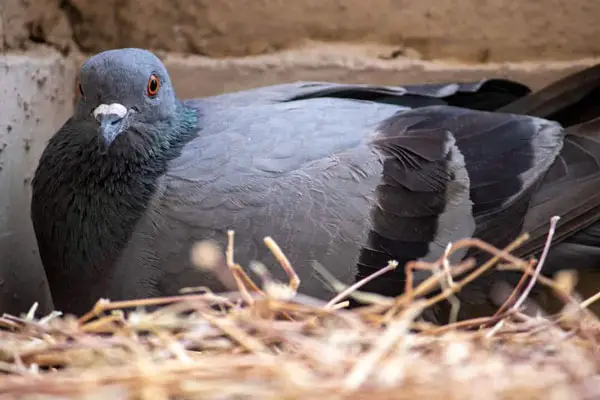
Here are various way crows locate and access pigeon eggs:
By Remembering the Location
Crows boast incredible visual acuity, allowing them to find and remember the locations of potential food sources quickly. As such, they are known to often spot pigeon nests from a distance and return time after time.
Furthermore, these birds have been observed frequently following other species who consume eggs- like sparrows-too benefit from the same nourishments.
Resourcefulness in Retrieving the Eggs
Crows are well-known for their intelligence and resourcefulness. They often find and access pigeon eggs, using inventive techniques. They use sticks or other items to reach those placed in hard-to-reach places, and their beaks to pry open nests. Crows are truly remarkable in their ability to find and acquire these eggs.
Feasting on Pigeon Eggs and Hatchlings
Crows are known to feast on the eggs and hatchlings of pigeons. They have been seen cracking the eggs open, eating the yolks and whites, and devouring the hatchlings. It is yet another example of the resourcefulness and intelligence of crows.
How Does Pigeon Protect Their Eggs From Predators?
Pigeons are known for their ability to adapt to human environments and for their strong bond with their mate and offspring. Pigeons are also known for their ability to protect their eggs from predators, which is an essential aspect of their reproductive strategy.
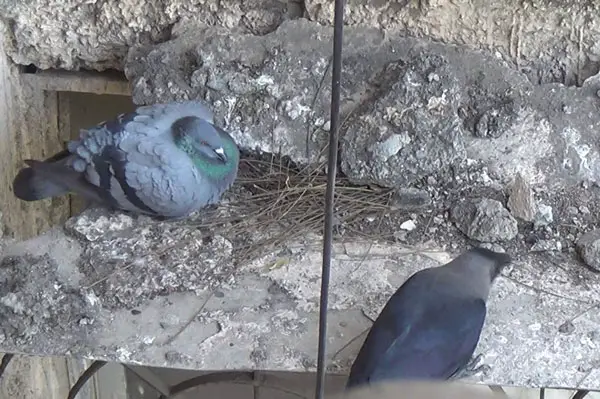
Here are some strategies that pigeons use to protect their eggs from predators.
Camouflage
Pigeons protect their eggs from predators by camouflaging them. Constructing the nest in a concealed location, such as a crevice or tucked away corner with twigs and leaves found nearby, serves to help hide it further.
Moreover, the color of the egg blends perfectly into its surroundings, making sure any prowling predator has an even harder time discovering it!
Vigilance
Pigeons exhibit extraordinary parental care when it comes to their eggs. They vigilantly alternate between incubating and watching for possible predators.
The birds will loudly call out and fly about the nest to protect their young, a remarkable feat.
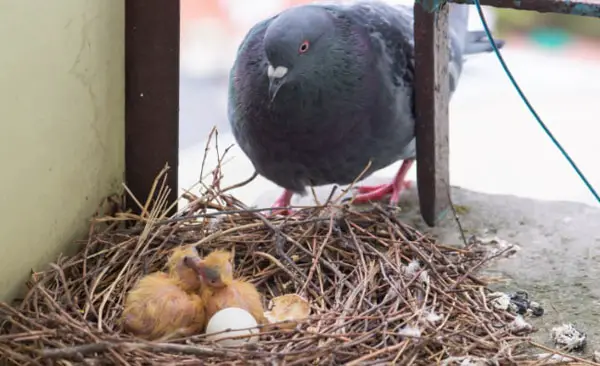
Physical Defense
Pigeons also use physical defense to protect their eggs from predators. They have sharp claws and beaks that they can use to defend their nest.
They will also use their wings to create a barrier around the nest, making it difficult for predators to get close to the eggs.
Group Defense
Pigeons also rely on group defense to protect their eggs. They often nest in colonies, and when one pair senses danger, they will call to the other pairs, who will come to their aid.
That creates a collective defense system that makes it more difficult for predators to attack any one nest successfully.
What Can I Do To Protect My Pigeon Eggs From Crows?
Pigeon eggs are a valuable and delicate resource for pigeon breeders and enthusiasts. Unfortunately, crows can pose a significant threat to these eggs, as they are known to steal and damage them. However, there are several steps you can take to protect your pigeon eggs from crows: They include:
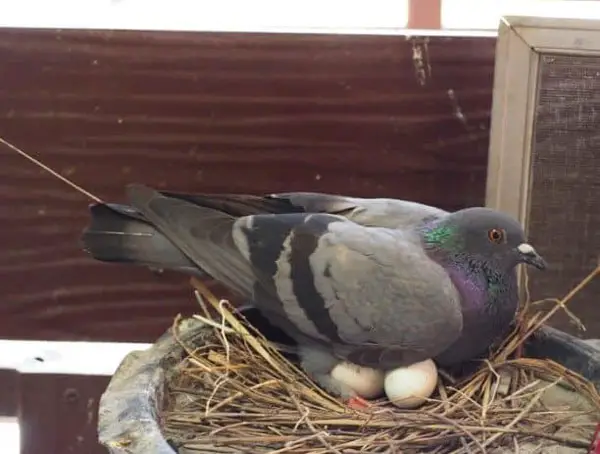
Fencing The Pigeon Coop or Aviary Area
One of the most effective ways to protect your pigeon eggs from crows is to install a sturdy fence around your pigeon coop or aviary. This will prevent crows from being able to access the eggs, as well as deter them from even trying.
Ensure that the fence is tall enough and made of a durable material that crows cannot easily break or fly over.
Netting The Coop or Aviary Area
An effective solution is to use fine mesh netting that covers the coop or aviary to safeguard your pigeon eggs from crows. This will stop ravens from gaining access to their delicacies while still allowing air and light in.
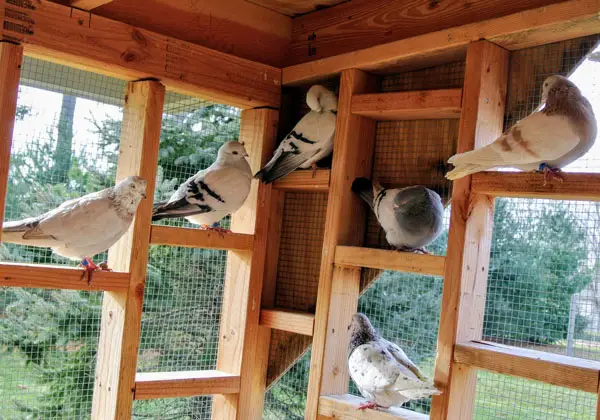
Ensure you stretch the protective fabric tightly around the frame of your shelter and firmly attach it so that crafty crows can’t find any loopholes.
Using Decoys To Keep The Crows Away
Using decoys can also be an effective way to protect your pigeon eggs from crows. Crows are known to be territorial and may be deterred by the presence of other birds.
Placing decoys of other birds, such as owls or hawks, around your coop or aviary can fool crows into thinking that predators already occupy the area.
Distracting The Crows To Discourage Attack
Another strategy to protect your pigeon eggs from crows is to distract them with other food sources. Crows are opportunistic feeders and may be drawn away from your eggs if they have access to other food nearby.
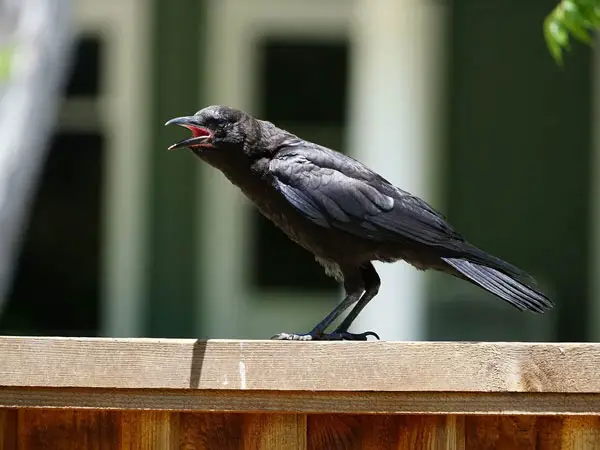
You can put the food near the coop or aviary to distract crows and keep them away from the eggs.
Keeping An Eye On The Pigeon Coop
Lastly, monitoring your coop regularly is essential to protect your pigeon eggs from crows. By keeping an eye on the area, you can spot crows early on and take action to deter them before they have a chance to steal or damage your eggs.
If you’re interested in learning more about pigeon behavior, you might find our articles on why do pigeons fly into windows and where do pigeons go in the winter helpful. Our article on why do pigeons fly into windows explores the reasons behind this peculiar behavior and suggests ways to prevent it. On the other hand, our article on where do pigeons go in the winter sheds light on the migratory habits of pigeons during the colder months. Check them out to deepen your understanding of pigeon behavior.Frequently Asked Questions (FAQs)
Here are some other frequently asked questions about a crow’s dietary habits.
Yes, crows are a danger to pigeons, too. Not only can they attack them, but they also compete with them for food resources.
Yes, crows are known to invade other birds’ nests. They may do this to steal eggs or chicks as food, mark the nesting area as their territory, or compete with other species.
Conclusion
Crows are astonishing creatures of great intelligence and capability to carry out intricate duties. Nonetheless, crows can also be known for raiding bird nests, stealing eggs, or even preying on other birds. That’s why you must take measures to protect your pigeons from them.
Provide an adequately shielded space for roosting, and utilize anti-crow products. Protect your pigeon eggs from crows by installing a sturdy fence, using fine mesh netting, or placing decoys. You can also distract them with other food, and monitor your coop regularly.
